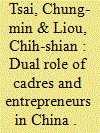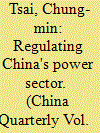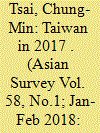| Srl | Item |
| 1 |
ID:
156666


|
|
|
|
|
| Summary/Abstract |
By examining China’s state-monopolized industries, we explore the evolution of managerial behavior. With the party-state’s continued emphasis on meritocracy in elite management, managers of China’s state-owned enterprises play a hybrid role as both party cadres and business entrepreneurs. This also reflects the adaptability of the Chinese Communist Party in pursuing pro-market reform.
|
|
|
|
|
|
|
|
|
|
|
|
|
|
|
|
| 2 |
ID:
105225


|
|
|
|
|
| Publication |
2011.
|
| Summary/Abstract |
The Chinese government has implemented electricity reform during the reform era, but the process has been accompanied by widespread power shortages and political struggles among state agencies. This paper addresses this contradiction by explaining two interrelated outcomes: the transformation of the state regulatory structure and the development of corporatized state-owned enterprises.
|
|
|
|
|
|
|
|
|
|
|
|
|
|
|
|
| 3 |
ID:
132955


|
|
|
|
|
| Publication |
2014.
|
| Summary/Abstract |
Throughout its period of economic transition, the Chinese state has readjusted its relationship with industry and developed new regulatory schemes. China's first industry-specific independent regulatory agency, the State Electricity Regulatory Commission (SERC), was created in 2003. Its operation does not follow Western practice which adopts the best institutional arrangement for autonomous regulators. This article will examine the failings and regulatory capture of SERC. I argue that because the process of creating a new regulator involves resource reallocation and power redistribution, SERC has suffered both endogenous and exogenous disadvantages since its inception. The compromised institutional design, along with insufficient resources and fragmented authority, has considerably weakened SERC's regulatory capacity. Moreover, SERC was not designed as part of the reform schedule, but rather emerged later as a response to institutional necessities, which also contributes to its vulnerability. As a result, the state has exposed SERC to potential capture by both government entities and regulated enterprises.
|
|
|
|
|
|
|
|
|
|
|
|
|
|
|
|
| 4 |
ID:
160389


|
|
|
|
|
| Summary/Abstract |
President Tsai Ing-wen has been plagued by controversial domestic issues, and her popularity has fallen significantly. While economic growth in Taiwan has increased, inequality and deteriorating cross-Strait relations have been hard on the ruling party. Tsai needs to work with the new premier, William Ching-te Lai, to regain people’s trust for the local elections in 2018.
|
|
|
|
|
|
|
|
|
|
|
|
|
|
|
|